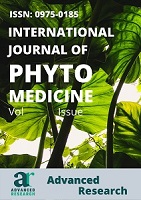Pharmacognostical and Phytochemical Investigations on Ipomoea pes-caprae Linn R. Br.
Keywords:
Ipomoea pes-caprae, Pharmacognostical and phytochemical parameters, Extractive valuesAbstract
Ipomoea pes-caprae Linn is commonly used as a first aid to treat jelly-fish stings and in ritual baths to alleviate evil spirits. The leaves were used against pain, inflammation, rheumatism and as stomachic and tonic. The present study was designed to investigate pharmacognosy and phytochemistry of Ipomoea pes-caprae its proper investigation and chemical profiling. Powdered plant extracts were subsequently soxhleted using petroleum ether (60-800C), methanol and water. Swaras was prepared from fresh plant extracts and studied for their phytochemical parameters and freshly prepared powder of I. pes-caprae was studies for its macroscopy for developing its identification parameters. Physicochemical study on I. pes-caprae herb yielded total ash (16.23%), acid insoluble ash (2.16%) and water soluble ash (13.48%) and value for loss on drying was (19.35%). Successive solvent extractive values of its powder were found to be 3.75 % w/w for petroleum ether (60-800C), 5.35 % w/w for methanol and 11.45 % w/w for aqueous extract and the value for swaras was 13.25 % w/w. Phytochemical screening on extracts and swaras revealed the presence of alkaloids, flavonoids, tannins, sterols, terpenoids and glycosides. Pharmacognostic characters, phytochemical values and macroscopic characters taken together as the outcome of this study could be used as the diagnostic tools for identification and standardization of I. pes-caprae for its purity and authencity.
References
. Manigauha A, Ganesh N, Kharya M
D. Morning glory: A new thirst insearch of de-novo therapeutic
approach. Int. J Phytomedicin. 2010;
: 18-21.
. Pongprayoon U, Bohlin L, Wasuwat S.
Neutralization of toxic effects of
different crude jelly-fish venoms by an
extract of Ipomoea pes-caprae (L.) R.
Br. J Ethnopharmacol. 1991; 35: 65-9.
. Agoramoorthy G, Chen Fu-An,
Venkatesalu V, Daih-Huang Kuo, Po
Chuen Shea. Evaluation of antioxidant
polyphenols from selected mangrove
plants of India. Asian J Chemistry.
; 20 (2): 1311-1322.
. Pongprayoon U, Bohlin L,
Baeckstrom P, Jacobsson U,
Lindstrom M, Soonthornsaratune P,
Wasuwat S. Anti-inflammatory activity
of Ipomoea pes-caprae. Planta Med.
; 56 (6): 661.
. Pongprayoon U, Baeckstrom P,
Jacobsson U, Lindstrom M, Bohlin L.
Antispasmodic activity of betadamascenone and E-phytol isolated
from Ipomoea pes-caprae. Planta
Med. 1992; 58(1): 19-21.
. De Souza M M, Madeira A O, Berti C,
Krogh R, Yunes R A, Cechinel-Filho
V. Antinociceptive properties of the
methanolic extract obtained from
Ipomoea pes-caprae (L.) R. Br. J
Ethnopharmacol. 2000; 69 (1): 85-90.
. Krogh R, Kroth R, Berti C, Madeira A
O, Souza M M, Cechinel Filho V,
Delle Monache F, Yunes R A.
Isolation and identification of
compounds with antinociceptive
action from Ipomoea pes-caprae (L.)
R. Br. J Pharmazie. 1999; 54(6): 464-
. Zandonai RH, Coelho F, Ferreira J,
Mendes AKB, Biavatti MW, Niero R,
Cechinel Filho V, Bueno EC.
Evaluation of the proliferative activity
of methanol extracts from six
medicinal plants in murine spleen
cells. Brazilian J Pharmaceutical Sci.
; 46(2): 323-333.
. Khandelwal K R. Practical
Pharmacognosy. Techniques and
Experiments, 15th ed, Nirali
Prakashan; New Delhi: 2006. p. 15-
. Philippi ME, Duarte BM, Da Silva CV,
De Souza MT, Niero R, Filho CV,
Bueno EC. Immunostimulatory activity
of Calophyllum brasiliense, Ipomoea
pes-caprae and Matayba
elaeagnoides demonstrated by human
peripheral blood mononuclear cells
prolipheration. Acta Poloniae
Pharmaceutica - Drug Research.
; 67(1): 69-73.
. Premanathan M, Nakashima H,
Kathiresan K, Rajendran N,
Yamamoto N. In-vitro anti human
immuno deficiency virus activity of
mangrove plants. Ind J Medi Res.
; 130: 276-279.
. Bragadeeswaran S, Prabhu K,
Sophia Rani S, Priyadharsini S,
Vembu N. Biomedical applications of
beach morning glory Ipomoea pescaprae. Int. J Tropical Medicine.
:5(4); 81-85.
. World Health Organization: Quality
control methods for medicinal plant
materials, WHO Library; 1998. p. 128-
. Anonymous. Macroscopic and
microscopic Examination: Quality
control methods for medicinal plant
materials. World Health Organization;
Geneva: 1998. p. 25-28.
. Kirtikar Basu. A text book of Indian
Medicinal Plants Vol. III, 2nd ed., 4th
reprint, Publisher, Lalit Mohan Basu,
Allahabad, India: 2006, p. 1726.
. Indian Pharmacopoeia, 3rd ed. Vol. II.
Publisher, Government of India,
Ministry of Health, Controller of
Publications; New Delhi: 1985. p. A74
- A75.
. Brain K R and Turner T D. The
evaluation of phytopharmaceuticals.
Wright Sci Technia. 1975; 6: p. 81.
. Ansari MM, Ahmad J, Ahmad A,
Ansari SH. Pharmacognostic
characterization and standardization
of Morus alba stem bark. J Medicinal
and Aromatic Plant Sci. 2006; 28: 31-
. Sofowora A. Medicinal plants and
traditional medicine in Africa. John
Wiley & son Ltd; 1993. p. 150-153.
. Trease G E and Evans W C.
Pharmacognosy. 13th ed. Bailliere
Tindale and Macmillian London: 1989.
p. 832.
. Herborne J B. Phytochemical
Methods 3rd ed. Chapman and Hall
Ltd; London: 1973. p. 135-203.
. [22]. Kokate C K. Practical
Pharmacognosy. 4rd ed. Vallabh
Prakashan; New Delhi: 1994. p. 107-
. [23]. Harborne J B. Phytochemical
Methods: A Guide to modern
techniques of plant analysis.
Chapman and Hall Ltd; London: 1973.
p. 49-188.
. Marinova D, Ribarova F, Atanassova
M. Total phenolics and total flavonoids
in Bulgarian fruits and vegetables, J
University of Chemical Technology
and Metallurgy. 2005; 40(3): 255-260.
. Khandelwal K R. Practical
Pharmacognosy. Techniques and
experiments, 19th ed., Nirali
Prakashan; New Delhi: 2008. p. 149-
. Anonymous. Quality control methods
for medicinal plant materials. (An
Authorized publication of World
Health Organization, Geneva). New
Delhi: A.I.T.B.S. Publishers &
Distributors (Regd.); 2002. P. 1-122.
. [27]. Kokate CK, Purohit AP,
Gokhale SB. Pharmacognosy. 34th
ed. Nirali Prakashan, Pune, India;
. Ansari SH. Essentials of
Pharmacognosy. 1st ed. Birla
Publications Pvt. Ltd. New Delhi:
P. 588-90.



